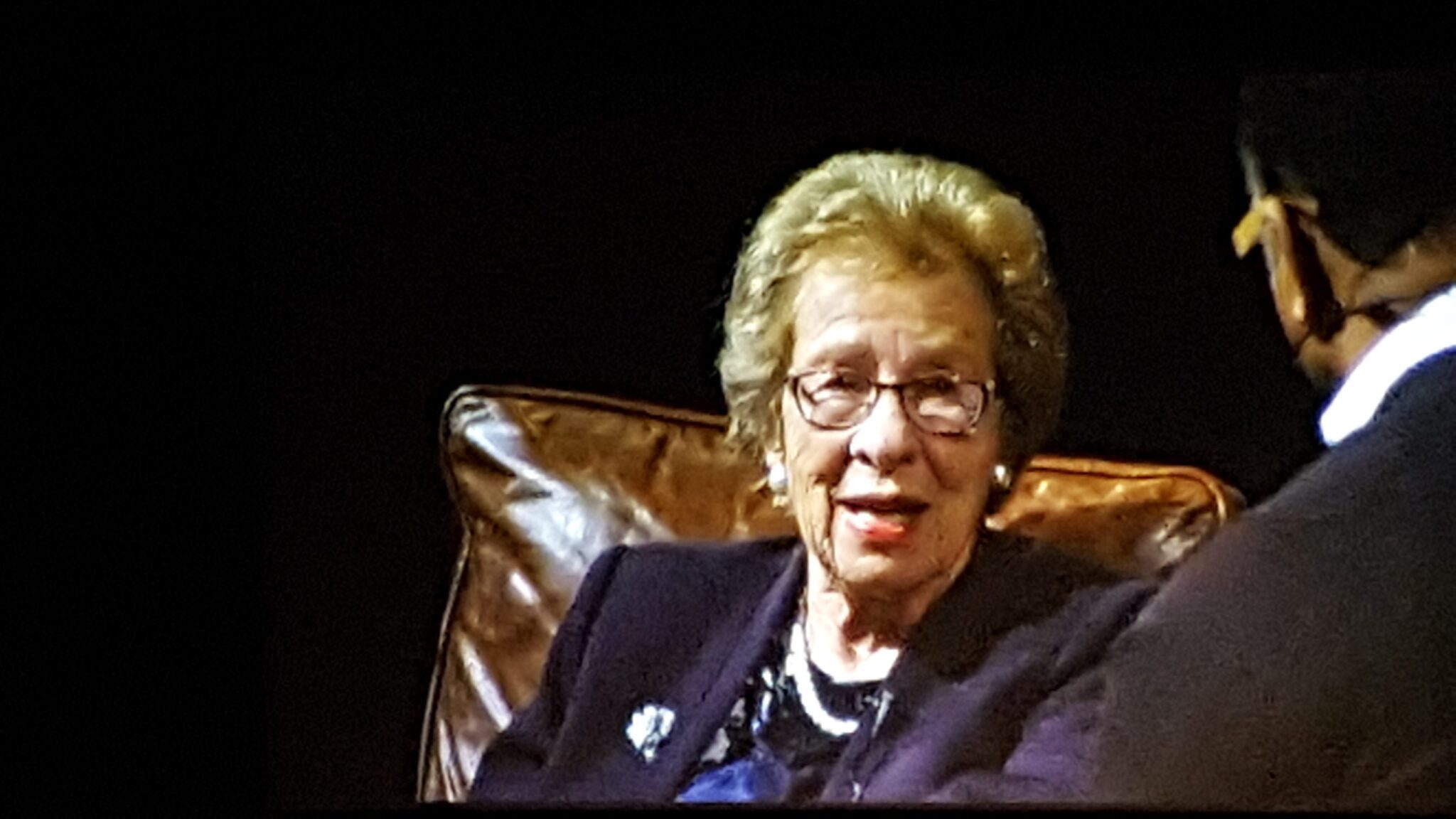Eva Schloss emphasizes today’s need for acceptance in Knoxville visit
Anne Franks stepsister gave a firsthand account of the horrors she experienced during the Holocaust on Tuesday, Feb. 21. She drew parallels between the world’s initial apathetic reaction to Jews and the current refusal to accept refugees.

Eva Schloss, author, Holocaust survivor and Anne Frank’s stepsister, visited Knoxville on Feb. 21 with much to say to her audience at the Civic Auditorium.
In an interview led by local radio and television host Hallerin Hilton Hill, Schloss recalled her experiences from before, during and after her family went into hiding in 1944. She alluded to similarities between then and now in reference to today’s political climate.
Many expressed gratitude for Schloss’s visit, and said that they were left with plenty to think about. In closing, Schloss offered advice for the young people who made up a sizeable part of the audience.
Knoxville Mayor Madeline Rogero gave opening remarks.
“These stories remind us that we are responsible to each other, and for each other,” she said. “These stories matter. They connect us to each other.”
Schloss was born in Vienna, Austria in 1929. She remembered an idyllic childhood, swimming in creeks, riding her bicycle and playing with Frank and her brother Heinz. Schloss and Frank knew each other for two years before their families went on the run from Nazi forces. It was not until some time after surviving, Jews were liberated from German death camps and that Schloss’s mother and Frank’s father were married.
When Schloss and her brother received the news from her father that they were to go into hiding, she was confused at first. She remembered asking her father, “What do you mean? Hiding, like the game? Like hide and seek?”
Unfortunately, it was far from a game, as history shows. Despite this, Schloss said, she hung on as long as she could, and recalling her childhood helped her make it through the horrors of the Holocaust. However, it could only take her so far.
“In the camp, I had hope. But afterwards, I had no hope, because this was just how life was going to be,”Schloss said. She recalled that she had thoughts of suicide at times because she had such trouble getting past the loss of her brother and father.
“I was so upset that the world would not let in Jewish people – like we see now, with refugees.”
Raeus Cannon, a Knoxville business owner who is Jewish herself, attended the event and shared her thoughts on the comparisons drawn between the past and the present.
“I’ve been horrified to see the country send people away that need help,” she said. “I had family that barely escaped the Holocaust, and I had family that I lost. So for me, this particular time and place in America is a very scary, scary place. I see a lot of similarities. And I’m glad she didn’t go into a lot of it, because I think it would have been difficult for her as a speaker in this community, but I think she did a very good job of being able to say, ‘This is the similarity that I see’, and leave it at that.”
Renee Pettigo, another audience member, has five grandchildren and expressed concern about the turn politics have taken recently. One grandchild is biracial, a second is autistic and a third has Down syndrome.
When Pettigo was young, the Jewish community center she attended regularly with her family was bombed. She told stories of facing many obstacles in her path, including being unable to join a sorority or date certain men when she was in college.
“[Anti-Semitism] was very prevalent, and nobody hid it. It just was. You worked around it,” Pettigo said. Perhaps due to these experiences, issues of acceptance have particular importance to her now.
“I am absolutely more likely now to hold my hand up and go, ‘That’s not okay. You don’t say that, that’s not acceptable’… And this woman coming and telling her story over and over again almost is a case of her holding her hand up, and going, ‘Excuse me… Pay attention…’,” she said. “For those of us that have walked down that path, we’re all going, ‘Hey, we know what this looks like.’ For people who have never experienced this, they’re going ‘This doesn’t affect me’, but they don’t understand that it does. Because it affects your children, and the community that you live in.”
Hill asked Schloss what she would tell young people of today if she were to offer a piece of advice. She answered his question without hesitation. “We are all one race: the human race.”
Edited by Kaitlin Flippo
Featured Image by Faith Held

